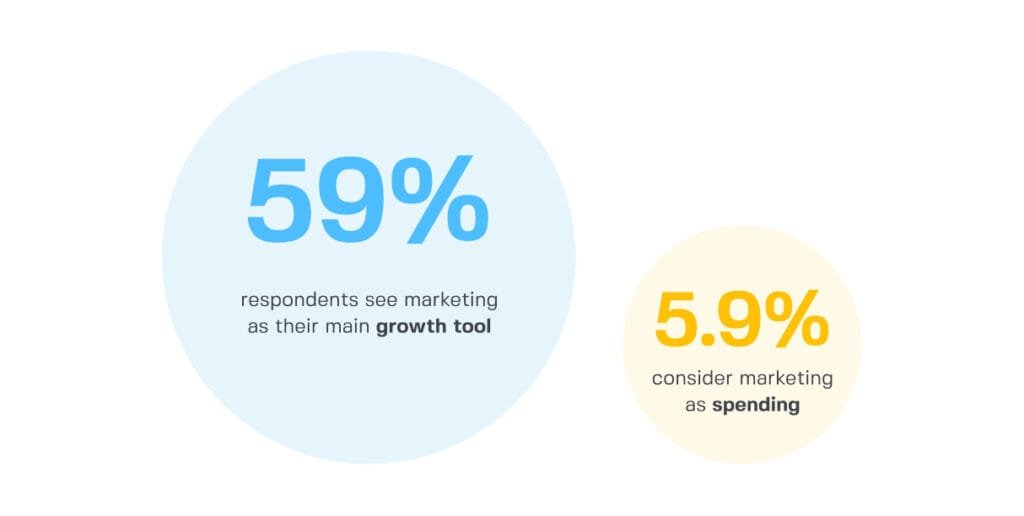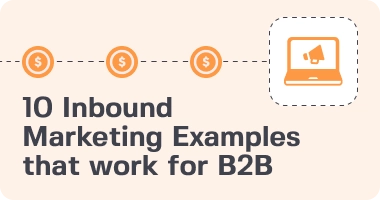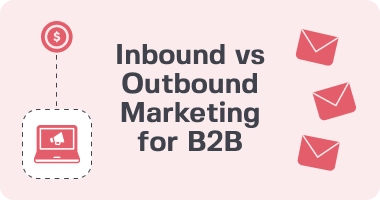With all the recent political and economic events in the world, the approaching 2024 may seem like a difficult, or even scary year for some tech companies. Understanding the target audience and competitive landscape through thorough market research is essential for making informed decisions about where to invest marketing resources. Economic downfall and the pre-recession state indeed may slow down your growth, which makes a strategic, but flexible approach to marketing more important than ever. Today we want to look at best practices that will help your tech business grow more efficiently in 2024 with strategic marketing budget planning!
Why should you plan your marketing budget?
Marketing budget is an important tool that can help you analyze your current performance and understand the directions in which you should move forward. Strategic marketing budget allocation is crucial for aligning financial resources with business goals, ensuring that funds are distributed effectively based on industry trends and company maturity.


Developing a marketing budget plan will also help you:
- Analyze your current marketing spend and switch to data-driven decision making
- Allocate funds to the right best performing channels
- Clearly understand what activities, services and partnerships you can afford
- Plan and predict the growth of your business
- Compare your progress year-on-year and even quarter-to-quarter to tweak strategy in the process
- Calculate your Marketing Return on Investment (MROI)
- Increase chances of reaching your goals.
How much should you spend on marketing in 2024?
When thinking about budget planning for a new year, it is easy to push marketing to the last levels of importance, as other operational costs may seem more important. However, in our recent research we found out that 59% of respondents see marketing as their main growth tool, while only 5.9% consider marketing as spending. You should keep in mind that while you can always choose a reliable partner to help you craft a strategy and provide a team of experts, allocating financial resources to stimulate growth and attract new leads should be a priority of founders and senior executives.

Allocating a specific percentage of revenue to marketing investments helps ensure that marketing expenditures are aligned with overall financial health and supports long-term growth.
Competitor Analysis
First step in planning your budget is to analyze your competitors. Analyzing competitors’ marketing strategies can provide valuable insights to inform your own budget planning. Knowing how much your competitors are spending on marketing and what channels they are using can give you industry benchmarks and help you find areas to differentiate. Competitor analysis will also allow you to benchmark against similar companies so you don’t get left behind in the market. Use SEMrush, SimilarWeb or public financial reports to get data on your competitors’ marketing.
Goals and Marketing Strategy
Your budget should be tied to your business goals and overall 2024 strategy. Are you looking to increase brand awareness, generate more leads or enter new markets? Clearly defined goals will help you allocate your budget better. For example, a brand awareness focus might require more spend on top of funnel activities like content marketing and social media, while a lead gen focus might shift spend to PPC and email marketing. Selecting appropriate marketing channels tailored to your target audience is crucial for effective budget allocation, as different channels yield varying levels of effectiveness and cost-efficiency. Align your budget to your strategic priorities so every dollar spent is working towards your business objectives.
Therefore, we suggest thinking of your marketing budget as a percentage of your revenue that you want to invest in your company’s growth. A general benchmark is to aim for 7-8% of your total (gross) revenue to be spent on marketing.
Revenue Percentage Budget Model

The revenue percentage budget model is a common approach for setting marketing budgets especially for established businesses. Utilizing a marketing budget template can help in organizing and tracking budgets for different marketing activities, facilitating project management, and enhancing strategic planning in marketing campaigns. This model involves allocating a fixed percentage of your projected revenue to marketing. For example a company expecting $10m in revenue might allocate 10%, or $1m, to marketing. The percentage you choose will depend on your industry, growth stage and competitive pressure. Newer companies or those in highly competitive markets might allocate a higher percentage, established brands with a strong market presence might allocate a lower one.
Lifetime Value Ratio in Detail

Understanding the lifetime value (LTV) of your customers and the cost of acquiring them (COA) is key to optimising your marketing budget. Aligning marketing efforts with overall business goals is crucial to ensure sustainable growth. The LTV to COA ratio helps you evaluate the profitability of your marketing and ensure your spending is sustainable long term.
Lifetime Value (LTV)
Lifetime Value (LTV) is the total revenue a business can expect from a customer over the lifetime of their relationship. Managing funds allocated to various marketing initiatives is crucial to maximize LTV. Calculating LTV involves looking at customer purchase behaviour, retention rates and average transaction value. Knowing your LTV allows you to work out how much you can afford to spend on acquiring new customers and still get a return on investment.
Cost of Acquisition
The Cost of Acquisition (COA) is the amount you spend to acquire a new customer. This includes all marketing and sales expenses, advertising, promotions and sales team salaries. Knowing your COA is key to budgeting as it helps you work out if your marketing is cost effective. By keeping your COA below your LTV you can ensure your marketing is contributing to long term profitability.
LTV to COA Ratio
The ideal LTV to COA ratio is 3:1, meaning the revenue from a customer should be at least 3 times the cost of acquiring them. Evaluating and optimizing marketing campaigns is crucial to maintaining a sustainable LTV to COA ratio. This ratio ensures your marketing spend is sustainable and profitable. If your ratio is below 3:1 you may be spending too much on marketing relative to the value of your customers and need to optimise your acquisition strategies. If your ratio is significantly above 3:1 you may be under investing in marketing and limiting your growth.
Average Contract Value

Another key metric that affects your marketing budget is the average contract value (ACV). Incorporating social media ads can significantly drive conversions and positively impact the ACV by transitioning potential leads from the consideration stage to the decision stage. ACV is the revenue per contract or sale and is relevant in industries with longer sales cycles or higher value contracts.
Close Rates
Close rates (the percentage of leads that become paying customers) directly impact your average contract value. Search engine optimization plays a crucial role in improving close rates by driving qualified leads to your website. A higher close rate means you are converting more leads into revenue and can justify more marketing spend to generate those leads. If your close rates are low you may need to invest in improving your sales process or targeting more qualified leads before you can increase your marketing budget.
Total Revenue
When budgeting consider the total revenue your marketing will generate. This includes new business and upsells or cross-sells to existing customers. By including total revenue you can work out the return on your marketing investment and adjust your budget accordingly. If your marketing is expected to drive significant revenue growth you may be able to justify a bigger budget.
Budgeting for 2024

- Industry Trends: Keep up to date with industry trends that will impact your marketing strategy, customer behaviour and emerging technologies.
- Economic Conditions: Adjust your budget to the broader economic environment, inflation, interest rates and consumer confidence.
- Competitive Landscape: Monitor your competitors to make sure your budget allows you to stay ahead of the market.
- Internal Resources: Consider your internal capabilities, your marketing team and the technology you have at your disposal.
- ROI Expectations: Set realistic expectations for the return on investment from your marketing spend and adjust your marketing budget allocation based on past performance and future projections. Adapting budget allocation in response to market trends and insights is crucial for optimizing marketing outcomes.
Budgeting in crisis: best practices
Before diving into best practices, we want to stress that 2024 will be a year of crisis, and your budget planning should reflect this challenge. Long-term budgeting to plan and manage marketing investments effectively is crucial for sustained growth and resource allocation. Your current customers will critically review and cut spending on products and services they do not see clear value from, and your potential leads will be more critical of the offerings as their spending capacity falls. Therefore, you should prove your value even harder than before. Here is how:
- Focus on building brand that people trust
So, people are more conservative with their decision-making in a crisis. To be able to make the cut, you should focus on generating trust in your brand, really creating those trust triggers. This can be done through user cases, positive reviews, third-media publication and PR – the activities you should definitely invest a portion of your marketing budget. When choosing where to allocate their limited resources, consumers will prefer those who prove in advance that they can be trusted.
- Plan for closely aligning sales and marketing
As the decision making process is longer in crisis, it is crucial for your business survival to speed and nurture leads as they go through the marketing funnel. This can only be done by closely aligning sales and marketing departments, both activity and budget-vise. Sales team has to tune in at the very beginning of the funnel and help smoozly transfer prospects right to the deal closure. For that, you should give the client more than they expect and create an amazing customer experience from the very beginning of your collaboration. This can be done through creation of highly relevant custom content, which is an area you should prioritize in your budgeting.
- Plan budget by quarter, not by year
Сrisis is obviously a time of unpredictability, so you should forget about year-long marketing and budget planning. The maximum horisent of your planning should be a quarter. This way you give yourself room for flexibility and testing to recession-proof yourself. Focus on analyzing quarterly return on marketing investment and adjust your budget accordingly.
- Align marketing budget planning with your company’s goals
Start with specific measurable goals for 2024. This will help you estimate the types of expenses you will incur. These goals should help to align your sales, marketing and service teams and prioritize budgeting categories.
Be specific with your goals. Every marketing department aims to “boost revenue” and “increase sales,” for example, and these goals don’t give you much direction. How will you boost revenue? What strategies will you use to increase sales?
Here are some example of specific, measurable goals:
- Get 7 MQLs and 3 SQL per month.
- Increase organic website traffic x2 monthly
- Grow founder’s social media by 5%
- Increase the number of free trial users with Paid-Per-Click (PPC) ads
Once you have a small list of 3-5 goals, prioritize them. You may need to sacrifice one goal so you can afford to reach another, so know in advance which goals are “musts” and which are “nice to haves.”
- Evaluate how your marketing spending performed in 2023
Make sure to analyze the progress in achieving your marketing & business goals in 2023 and determine which marketing activities performed best and worst to help you achieve these goals.
Activities to analyze may include:
- Content & inbound marketing
- Video marketing
- SEO & Linkbuilding
- Display advertising
- Paid social media
- Paid search promotion
- Email marketing & email automation
- ABM
- Cold outreach
- SMM
- PR
- Influencer marketing
- Podcasts
- Streaming TV
- UX & Customer experience improvement
- Estimate your monthly marketing operational costs
To start allocating your budget, you need to estimate your monthly marketing operational costs. These costs are all the basic things you need to pay for to keep the marketing department running. These expenses include the cost of marketing tools, website hosting services, marketing team member salaries, and paid WordPress themes.
- Don’t forget to sort out your data
Having clean, sorted-out data is key to make your budgeting planning data driven, and increase ROI!
- Allocate you budget to best performing channels from last year
A great idea would be to invest into channels that you already have tested and saw the results from.
For each option you choose, brainstorm the potential costs you might incur. For example, for influencer marketing, you will need funds to compensate your influencers and free products for them to showcase. Or, for video marketing, you’ll need video equipment, actors, video editing software, and a filming studio.
It might help to estimate your costs over a month and extrapolate them out to 12 months. You don’t always need an exact figure either — just estimate the cost of each channel and add 5-10% to account for any extra expenses you might incur.
- Prepare to measure ROI
Measuring return on your marketing investment quarter-by-quarter should be your #1metric to flexibly approach marketing planning and allocate budget to increase ROI even more. This way, recession will prove to be a period of opportunity and exploration for you!
How to start your planning now!
Flexibility, creating and testing A LOT of marketing hypotheses is a way to not only plan budget efficiently, but to also ensure the successful performance of your marketing in 2024. Utilizing a marketing budget template can help in organizing and tracking budgets for different marketing activities, facilitating project management, and enhancing strategic planning in marketing campaigns. Unfortunately, it is more difficult to implement such scope of flexibility with an in-house marketing team, as you would need a lot of people, resources and expertise for constant testing. Partnering with reliable companies that both have expertise and people resources to experiment and test, giving you the most flexibility should be a topic to consider while allocating your marketing budget for 2024.
If you want even more practical insights and are interested to see how other tech companies plan their budget, please participate in our research by filling out this super short questionnaire. We will use this information to create a case study that we will share with you, alongside with your personalized budgeting plan. Click here to take part now!
















